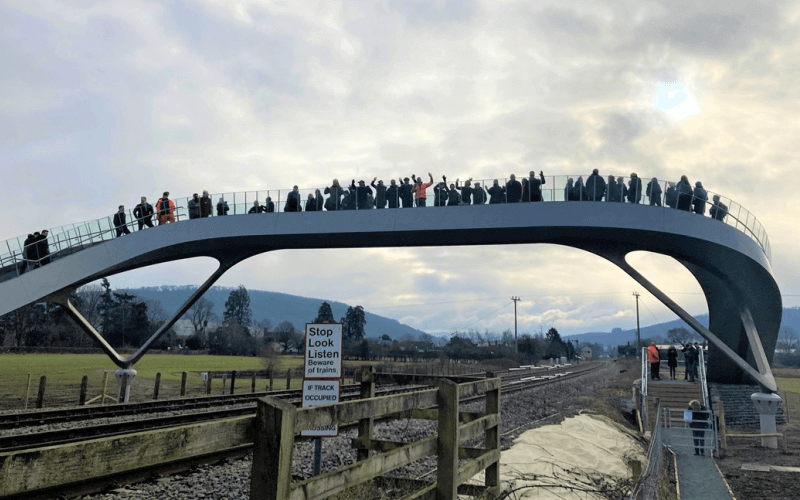Network Rail has been forced into a “deeply troubling” admission that it has no idea how many inaccessible footbridges it is planning to build across Britain, while claiming it is too time-consuming and expensive to find out.
The public body, which owns and runs most of the country’s rail infrastructure, has previously claimed it had plans to build 17 inaccessible footbridges across England, Scotland and Wales in 2022, 2023 and 2024.
But it has now admitted that it keeps no central records of how many footbridges it builds that are not accessible to disabled people and others who cannot use steps.
It has accepted that the true number would be higher than 17.
It has also admitted that the information it previously provided to Disability News Service (DNS) was “neither accurate nor comprehensive” but that to provide accurate figures would impose a “disproportionate burden”.
DNS had asked why Network Rail was claiming there would be no new inaccessible footbridges in its southern region when plans for at least three stepped bridges had emerged: in Hounslow, west London; in Wokingham, Berkshire; and in Egham, Surrey.
All three of these bridges will allow people to cross railway lines but are not within train stations.
Two disabled campaigners spoke out this week to raise concerns about Network Rail’s actions.
Doug Paulley, who has helped expose its plans to build new inaccessible footbridges, including one at Copmanthorpe (pictured), near York, said: “It is really telling that Network Rail are unable to say how many inaccessible footbridges they are building.
“The fact that it is so commonplace is totally unacceptable; we should not be building new inaccessible infrastructure in 2023, and the fact that they do not have any register of the accessibility of things they are building tells me that they truly don’t care about access, no matter what smooth words they spout.”
Paulley pointed to Highways England’s guidelines for road footbridges, which also apply across Scotland, Northern Ireland and Wales, and state: “Access by stairs alone should only be evaluated in exceptional circumstances and with the agreement of local access and disability groups.”
He said: “Highways England evidently has better standards than Network Rail.”
Flick Williams, who has played a key role in campaigning against the Copmanthorpe plans, said: “The news that Network Rail has no idea how many inaccessible footbridges it is building is deeply troubling.
“It suggests they have no regard to their responsibilities under the public sector equality duty and seem to think they are somehow exempt from meeting the duties laid out in the Equality Act.
“As someone who was told in person by Network Rail executives that my access needs are ‘not value for taxpayer money’, it comes as little surprise that equal access for whole communities is not a concern for them.
“They are confirming that they regard all of us with protected characteristics as second-class citizens.”
The admissions came in Network Rail’s internal review of how it handled an initial request for information from DNS under the Environmental Information Regulations.
It said that it operated a “devolved business model” which means “it is occasionally more difficult to gather large volumes of information when it’s spread across the company”.
And it said there was “no central repository of information that shows the bridges that have been constructed or that will be constructed in any given year”, with this information “held at a regional level by a number of different teams”.
To gather the information requested would likely take at least 60 hours, it said, which would be seen as a “disproportionate burden” under the regulations.
It said it accepted that the DNS request had an “inherent value” because making the railways more accessible was “a key commitment” of Network Rail and the government, but it claimed that the benefit of knowing how many new footbridges were accessible to disabled people was “marginal at best”.
This was because a number “doesn’t explain anything about the local conditions which have led to a footbridge being constructed in a particular way”.
A note from the editor:
Please consider making a voluntary financial contribution to support the work of DNS and allow it to continue producing independent, carefully-researched news stories that focus on the lives and rights of disabled people and their user-led organisations.
Please do not contribute if you cannot afford to do so, and please note that DNS is not a charity. It is run and owned by disabled journalist John Pring and has been from its launch in April 2009.
Thank you for anything you can do to support the work of DNS…

 Government’s ‘weak’ response to damning transport access report puts right to travel in ‘grave danger’
Government’s ‘weak’ response to damning transport access report puts right to travel in ‘grave danger’ Self-driving taxis that are not accessible will be allowed pilot scheme licenses, government suggests
Self-driving taxis that are not accessible will be allowed pilot scheme licenses, government suggests Disabled students set to protest over cuts in support
Disabled students set to protest over cuts in support